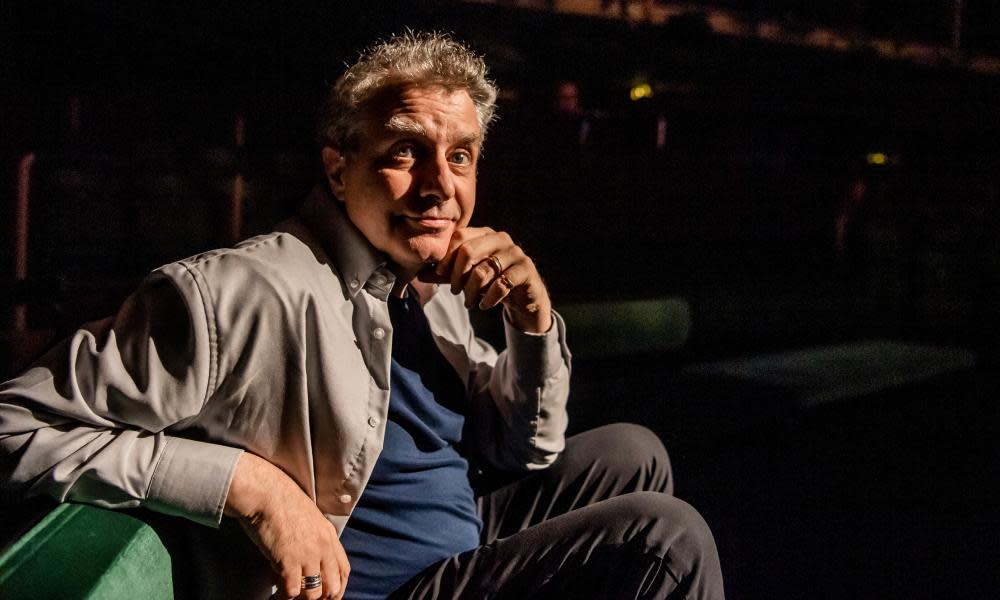On my radar: Phelim McDermott’s cultural highlights

The actor and theatre director Phelim McDermott was born in Manchester in 1963 and made his screen debut as a jester in the 1991 film Robin Hood. He co-founded the theatre company Improbable in 1996. The company’s first production, 70 Hill Lane, was based on McDermott’s childhood experience of a poltergeist. He directs opera as well as theatre, including Satyagraha by Philip Glass, first staged in 2007 for the ENO. McDermott’s next show, in collaboration with the RSC, is an adaptation of 1988 Studio Ghibli film My Neighbour Totoro, previewing at the Barbican from 8 October.
1. Novel
Growing up, I loved Alan Garner’s novels. He came to a show I did a few years ago and afterwards talked about how he thought he’d finished with books but then realised: “Damn it, I’ve got an idea for another one.” Treacle Walker is short and very potent, like a lot of his work. It’s about a young man who lives alone and gets visited by a strange, shamanic rag-and-bone man, with whom he swaps totemic items. It’s a beautiful bookend to his work and I’m so pleased it’s on the Booker shortlist.
2. Stage
Only an Octave Apart at Wilton’s Music Hall, London
This is a show by the countertenor Anthony Roth Costanzo and cabaret performer Justin Vivian Bond, a mix of high-art opera and downtown New York experimental drag. I haven’t seen it yet, but would love to, because both of them are extraordinary performers. Justin’s act is so sophisticated and strange and wonderful, and Anthony has an incredibly beautiful voice. They’re two people who shouldn’t really be in the same room – it’s like two different chemicals coming together to create something quite extraordinary and dangerous.
3. Podcast
The Modern Fairy Sightings Podcast
I’m outing myself as a believer in fairies here. The presenter, Jo Hickey-Hall, interviews ordinary people who write in with stories about seeing fairies and other strange creatures. Some of the stories are really scary, and sometimes they’re absolutely like: “I saw a very small man walk through my bedroom wearing a pointy hat.” I love listening to it. When I can’t get to sleep at night, I put it on. In the morning, I can’t remember which bits of it I’ve dreamed. To paraphrase Ken Campbell: “I’m not mad, I’ve just listened to different podcasts.”
4. Blog

This is one of the oldest blogs in existence. Seth Godin started out in the marketing and tech worlds and moved into social activism. His posts are often very short and pithy; he calls it thinking out loud in public. He says business people should be more like artists, and his definition of art is that you need to be able to say: “this might fail”, and if you can’t say that, it’s not really art. He writes books too, and has a podcast called Akimbo, which is brilliant as well. He’s a bit like a marketing version of Malcolm Gladwell.
5. Place
Floatworks is a flotation tank centre in Vauxhall. You get in a pod containing high salt-density water, not very deep, and then shut the lid. It’s kind of like low-effort meditation, because you’ve no choice but go internal. Sometimes I go in and it’s just my mind chattering away and I think about shows and have some good ideas. Sometimes, without trying, you get taken to a deep theta state. You always come out and the world looks different, brighter, and you’re inside your body in a different way.
6. TV
The Lord of the Rings: The Rings of Power (Amazon)

My son Riddley, who is 10, is obsessed with The Lord of the Rings, and is a walking Tolkien encyclopedia. He said: “Daddy, I want you to watch The Rings of Power with me, so I can tell you all the things that they’ve got wrong.” He enjoyed the first episode, and watching it with him makes me a bit kinder, because I would [otherwise] have a very critical eye on it. JRR Tolkien is like a showrunner who’s not around any more, so they’re having to create the series from the skeletons of a synopsis. I’ll continue watching it. I have no choice. Riddley will make me watch.


